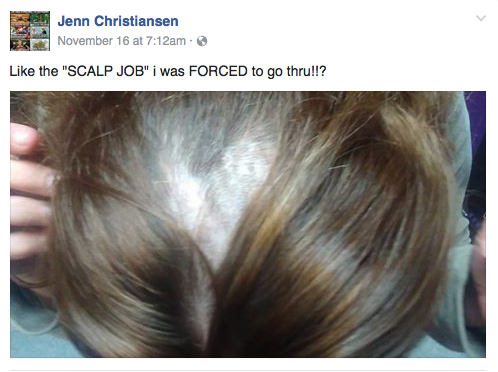A Colorado woman who was ordered to submit to a hair follicle drug test is claiming that the lab tech who performed the collection botched the job and butchered her hair, leaving her with a bald spot.
The woman, Jenn Christiansen, says she is an admitted marijuana user and was ordered by the courts to submit a hair sample as part of a court proceeding that would determine if she would be allowed to regain custody of her children.

Learn How to Pass a Hair Follicle Drug Test
There is only one hair treatment method that has consistently produced "Passes" on the hair drug test and we want to show you how you can pass your test too.
Normally the test only requires a relatively small sample of hair so if her claims are to be believed, the technician really botched this one.
She posted a photo on Facebook so there’s reason to believe that she is indeed telling the truth.
That brings up the question of what type of training the collection technicians are required to have at the drug testing labs. Christiansen is calling for more government oversight into the process and we tend to agree with her as this is not the first case we’ve heard about where the technician either through malice or simple incompetence has taken a hair sample in such as to create an obvious patch where the sample was taken.
What if this were not a court ordered hair follicle drug test? What if this was a mere pre-employment screening and the person had to return to their current employer with an obvious patch of missing hair which resulted in them getting fired due to the fact that their employer was now aware they were looking for another job?
What would even be your recourse? Could you sue the company that required you to take the test? Could you sue the hair drug test lab? Could you sue the technician who botched the collection?
Unfortunately, there seems to be little recourse. One would simply lose their job whether or not they even tested positive and there seems to be little they could even do about it.
We hope Ms. Christiansen at least raises the question of oversight because the results of a botched collection could have serious financial consequences on those being tested.

